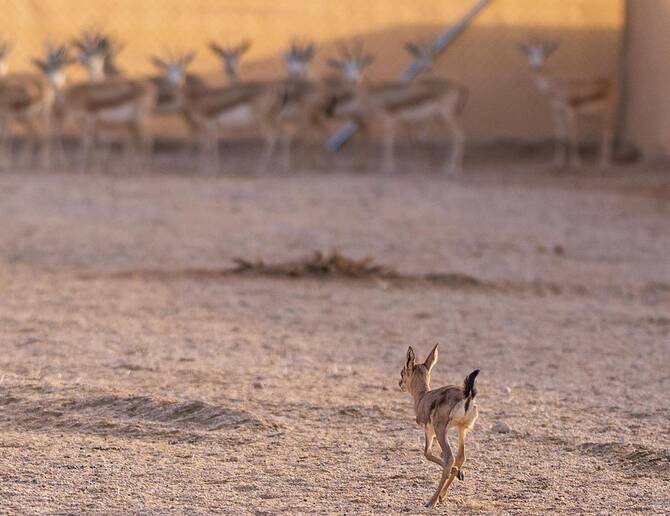
- ARAB NEWS
- 31 Jul 2025

Scientists have long dreamed of regenerating extinct animals — a dream that is now reality thanks to advances in molecular science and genetic techniques. However, the cost, value, and significance of such efforts have always been questionable.
The recent news about the “resurrection” of the dire wolf is captivating — but somewhat misleading. Scientists used ancient DNA from dire wolf fossils to modify a small segment of the gray wolf genome, recreating certain physical traits reminiscent of the extinct dire wolf.
But this does not mean the species has been revived. The dire wolf and gray wolf diverged more than 5 million years ago. A genetically modified gray wolf exhibiting some traits of the dire wolf has been developed — but it is not a resurrection.
Genetic engineering is a contentious issue because it is invasive and permanently alters an organism’s genetic profile. The process of genetically engineering mammals is slow, tedious, and expensive. The insertion, modification and deletion of genes are often heritable, producing new strains or breeds that do not occur naturally.
This raises questions about their biological, psychological and social characteristics, as well as their adaptability and disease resistance.
While cloning can help save endangered species from extinction, it may also lead to genetic homogeneity, weakening their long-term survival in the wild.
The International Union for Conservation of Nature predicts that by the end of this century nearly all critically endangered species worldwide — and 67 percent of endangered species — could be lost forever.
In Saudi Arabia, the rise of motor vehicles and the widespread ownership of firearms after the Second World War led to an explosion in hunting. This led to a significant decline in wild species — some now facing imminent extinction.
Examples include the Arabian ostrich, the onager and the Saudi gazelle. Sadly, some carnivorous species, such as the Arabian cheetah and lion, have long gone extinct in the Kingdom.
Several conservation organizations argue that resources would be better spent on saving endangered species by mitigating human impact on ecosystems.
Hany Tatwany
In 1989, we launched a worldwide campaign to find the Saudi gazelle, dubbed “Operation Saudi Gazelle,” to locate living specimens of this unique animal, found exclusively in the Kingdom. The gazelle was extinct in the wild and known only from museum skin samples.
After failing to locate living gazelles in the wild, we redirected our efforts to protecting endangered species that still exist in the Kingdom.
Several conservation organizations argue that resources would be better spent on saving endangered species by mitigating human impact on ecosystems.
After all, pouring scientific and financial capital into reviving extinct species like the dire wolf — not to mention the woolly mammoth, thylacine or even the dodo — does nothing to help the millions of species alive today that urgently need our support.
Science can — and should — support conservation. But it must be grounded in ethics and responsibility. Misleading headlines do more harm than good.
What is lacking is not technology but support, funding and consistent care for the biodiversity that still survives.
We are losing species every day at an alarming rate, while simultaneously spending millions trying to bring back animals that no longer exist.
Instead, scientists should be fighting to protect the animals still clinging to existence. They are not extinct or mythical. They are just overlooked.